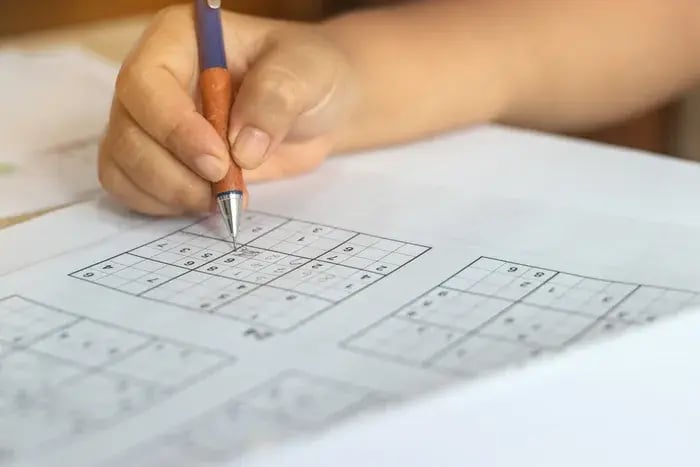- Improves Logical and Analytical Thinking
- Gains Confidence with Math Skills
- Hands-On Learning
- Independent and Group Learning Encouraged
- Math made Fun and Engaging
Introduction
Math can become enjoyable when the children are presented with interactive games that challenge them to think and come up with answers. Even at home, math can be introduced through playful activities that promote problem-solving abilities, logical thinking, and creativity in kids. From number puzzles to multiplication challenges, math games have been adapted for different ages so that the learning process remains enjoyable. A child can make the most out of block games, card games, and practical activities. Here are seven simple math games that help improve analytical and creative thinking across various age groups.
Number Hunt: For Ages 3-5

This game introduces young learners to number recognition and counting. Hide number cards around the house and ask kids to find them in order. They can match numbers to objects, reinforcing basic math concepts. This engaging activity improves number sense and enhances observational skills.
Shape Sorting: For Ages 4-6
Using everyday objects or cut-out shapes, kids classify different geometric figures. This game enhances spatial awareness and early geometry skills. Parents can introduce advanced concepts like symmetry and patterns, making shape sorting an excellent hands-on learning experience.
Dice Addition Challenge: For Ages 5-7
Have kids roll two dice and add up the numbers. They can compete to reach a target sum first. This game will definitely strengthen addition skills, mental mathematics, and quick thinking to make learning exciting.
Multiplication Bingo: For Age 7-9

Create bingo cards with multiplication equations. Call out answers, and kids must find the matching problem. This game reinforces times tables in a fun way, encouraging children to recall multiplication facts quickly while enjoying a classic game format.
Math Riddles and Puzzles: For Ages 8-10
Challenging kids with math riddles sharpens problem-solving skills. Use puzzles involving logical reasoning, patterns, and number tricks. These activities boost critical thinking, making math engaging and less intimidating.
Sudoku for Beginners: For Ages 9-12
Sudoku puzzles help kids develop logical reasoning and pattern recognition. Start with 4x4 grids and progress to larger formats. This game encourages patience, attention to detail, and structured thinking, making it an excellent brain-training activity.
Budgeting Game: For Ages 10-12
Give children a budget and challenge them to plan a meal or a small shopping list within that amount. This practical game introduces financial literacy, addition, subtraction, and strategic decision-making in an interactive way.
5 Advantages of Math Games for Children
Improves Logical and Analytical Thinking
Math games challenge kids to think critically and solve problems effectively. These activities build strong analytical skills that can be applied in everyday learning and decision-making.
Gains Confidence with Math Skills
When children enjoy fun, engaging math activities, they become more confident in their abilities. Solved problems result in a better attitude toward learning and improve school performance.
Hands-On Learning
Many math games are action, like play-block-games amongst children, that aid in developing the sense of touch. Physical play aids in retention and appreciating mathematical facts.
Independent and Group Learning Encouraged
Kids can play math games solo or with peers, encouraging both independent thinking and teamwork. These games foster collaboration, communication, and problem-solving in social settings.
Math made Fun and Engaging
. Math games make learning an enjoyable activity that reduces fear in numbers. If kids connect mathematics with fun, they tend to develop an interest in solving problems and solving number challenges for their whole lives.
Things to Look Out for While Identifying Free Math Games for Kids

Age Relevance: Ensure that the game suits the age and the needs of the child's developmental stage.
Educational Worth: Choose games that can strengthen core math concepts and skills.
Interactivity and Engagement: Choose games that allow engagement and active thinking.
Ease of Use: Search for games with simple and kid-friendly designs.
Device Compatibility: Ensure that a game can function on devices both online and offline.
Math games make learning more dynamic and entertaining while helping the child build the essential skills in a playful way. In this case, the creative activities of these games give children the logical mind, confidence, and much excitement towards math.
Deepali Verma is a senior food and wellness writer with over a decade of experience in top media houses, crafting engaging narratives. She is a professional home baker and loves exploring food from every corner of the world to reading cookbooks. She believes a healthy lifestyle is a combination of mental, spiritual and physical fitness. Her goal always remains to keep moving, eating seasonal and practicing gratitude.
The views expressed are that of the expert alone.
The information provided in this content is for informational purposes only and should not be considered a substitute for professional medical advice, diagnosis, or treatment. Always seek the advice of your physician or another qualified healthcare provider before making any significant changes to your diet, exercise, or medication routines.
References
https://www.98thpercentile.com/blog/fun-math-games-for-kids-and-adults
https://thirdspacelearning.com/blog/fun-maths-games-activities-for-kids/
https://www.21kschool.com/in/blog/free-maths-games-for-kids/










